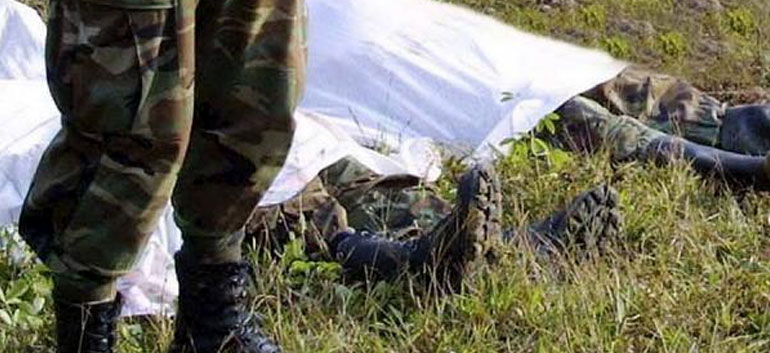Colombia’s highest administrative court has called on the country’s justice system to be more effective in processing those members of the military involved in the “false positives” scandal.
The State Council said that such cases must be investigated and processed properly, in order to comply with international norms concerning human rights. The declaration was made on Wednesday during the sentencing of a soldier found guilty of presenting a murdered farmer as a guerrilla fighter in 1993.
Those civilians who are murdered then dressed up as guerrilla fighters are known as “false positives.” There have been almost 3900 false positives in Colombia since 1984. During the 2000s in particular, the armed forces – aided by paramilitary groups – would kidnap civilians, murder them, then dress them as rebel fighters in order to inflate the army’s figures for combat kills.
FACT SHEETS: False Positives
MORE: Colombia military murdered 3900 civilians to inflate effectiveness: Prosecution
The President at the time, Alvaro Uribe, denied the armed forces were killing civilians until late 2008, when investigators linked the bodies of unidentified rebel fighters found in the north of the country to people who had been reported missing in Soacha, a poor suburb in the south of the capital Bogota.
This latest case involves the death of a farmer on March 28, 1993, in the municipality of Tello, Huila state. The army had claimed that the farmer was collaborating with rebel group FARC, and was thus a legitimate target.
But the Third Section of the State Council, led by Danilo Rojas, found that there was sufficient evidence to conclude that the farmer had been executed, shot at point blank range.
The Counil criticised the investigation carried out by the army, which allegedly only took into account the testimonies of those in uniform, and not the victim’s family, nor his employer.
“If the respective cases are not properly investigated and decided upon by the relevant judicial authoirites in a country, then the damage caused will be, eventually, the involvement of the international judicial system concerning human rights,” the Council declared.
As part of the sentence, the Ministry of Defense must release a statement admitting that the victim killed in 1993 was not a guerrilla fighter, but an ordinary civilian executed by soldiers of the Armed Forces. The ministry must also pay $125,000 to the family of the victim.
Tello, Huila
Sources
- Falsos positivos podrían llegar a manos de sistemas internacionales de justicia (La Tarde)
- Justicia debe ser más efectiva en procesos por “falsos positivos”: Consejo de Estado (El Espectador)
- Consejo de Estado condenó al Ejército por falso positivo en el Huila (Radio Santa Fe)
- ‘Falsos positivos’: 23 años de horror (Semana)


